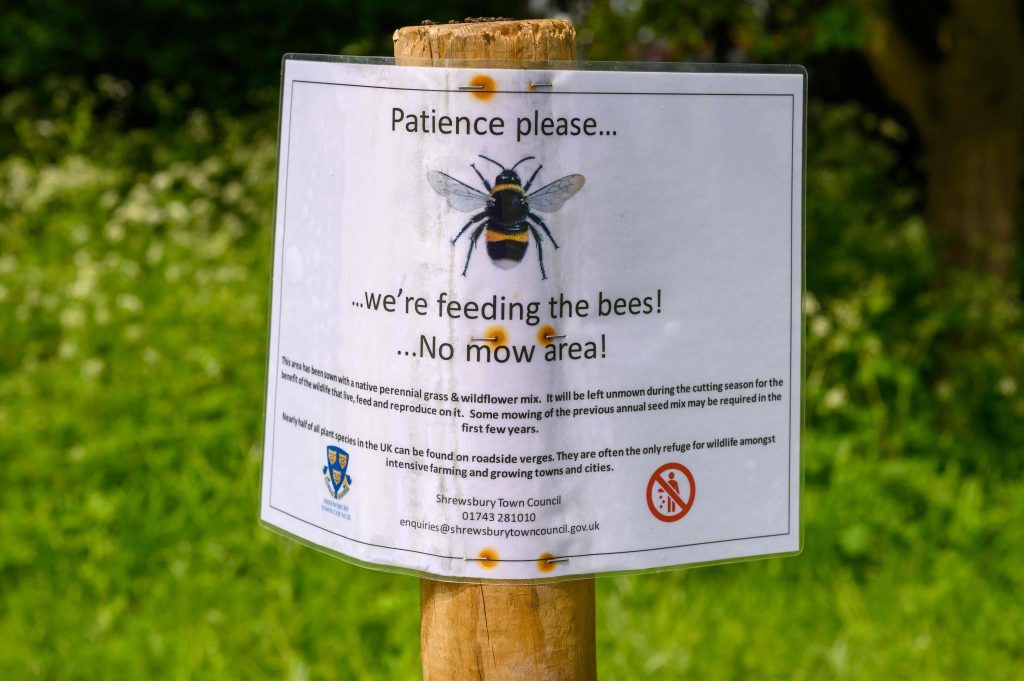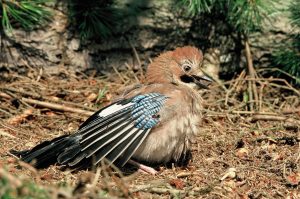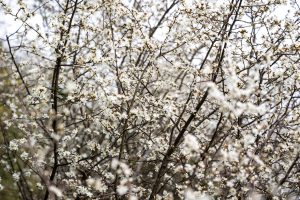Is the message getting through?
A few years ago, the launch of the No Mow May campaign by Plantlife was quite radical. Conscientious gardeners undoubtedly baulked at the very idea of not mowing the lawn for a month in the midst of the growing season. But maybe the message is getting through. A recent walk around my local area revealed an increasing number of what would previously be thought of as scruffy gardens. Unkept borders, uncut lawns and even weeds being allowed to gain a foothold in between paving, all providing that either environmental concerns are starting to take root (excuse the pun) in deepest suburbia or my local area is going to rack and ruin. I’d like to think it is the former, and there is other evidence to support this idea.
A few weeks ago, I was heartened to see a number of signs had been put up along a grass verge on the outskirts of a local small town. The setting was already idyllic, with rolling hills and sheep bleating in the nearby fields, but to see signs informing passersby that a considerable length of verge was going to be left to its own devices was something of a surprise. Normally this area took pride in being neat and tidy, so getting the local council to agree to this was, in my opinion, significant.
But I was further hearted when, on a recent walk near where I live, I spotted a couple more signs on the edge of a playing field. The signs seemed to have been put in place as a means to stop any locals from contacting the council to moan about the edge of the field. This indicates two things. Firstly, a degree of foresight on the part of the council who look after such things, but secondly, it would seem that, in the past, they have had complaints! Why is beyond me, but sadly in this part of the ‘shire’, I’m not surprised. That’s why the evidence mentioned earlier is significant. The more locals that abandon the mower in May, the less need there will be for the use of signs like this.
Despite my optimism, there are still a good number of diehards in the local area who can be heard furiously mowing as soon as there is a dry day or even a few hours. Close by, there is a lawn that has been mown to within an inch of its life. Even more worrying is the same person has seen fit to cut the hedges surrounding his garden, a hedge that is often the home for nesting blackbirds. It would seem a disregard for nature is still alive and well in the suburbs, but maybe, just maybe, the message is getting through, and such blind adherence to lifetime habits like having a manicured lawn will soon be a thing of the past. At least it is better than having a plastic lawn!
Don’t start me on that one.
Phil Pickin
A few weeks ago, I was heartened to see a number of signs had been put up along a grass verge on the outskirts of a local small town. The setting was already idyllic, with rolling hills and sheep bleating in the nearby fields, but to see signs informing passersby that a considerable length of verge was going to be left to its own devices was something of a surprise. Normally this area took pride in being neat and tidy, so getting the local council to agree to this was, in my opinion, significant.
But I was further hearted when, on a recent walk near where I live, I spotted a couple more signs on the edge of a playing field. The signs seemed to have been put in place as a means to stop any locals from contacting the council to moan about the edge of the field. This indicates two things. Firstly, a degree of foresight on the part of the council who look after such things, but secondly, it would seem that, in the past, they have had complaints! Why is beyond me, but sadly in this part of the ‘shire’, I’m not surprised. That’s why the evidence mentioned earlier is significant. The more locals that abandon the mower in May, the less need there will be for the use of signs like this.
Despite my optimism, there are still a good number of diehards in the local area who can be heard furiously mowing as soon as there is a dry day or even a few hours. Close by, there is a lawn that has been mown to within an inch of its life. Even more worrying is the same person has seen fit to cut the hedges surrounding his garden, a hedge that is often the home for nesting blackbirds. It would seem a disregard for nature is still alive and well in the suburbs, but maybe, just maybe, the message is getting through, and such blind adherence to lifetime habits like having a manicured lawn will soon be a thing of the past. At least it is better than having a plastic lawn!
Don’t start me on that one.
Phil Pickin



